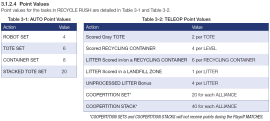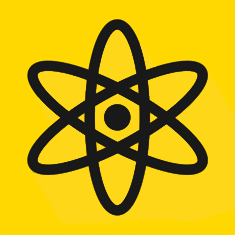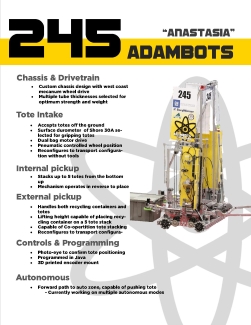Our Solution: Anastasia
Our 2015 FRC robot, Anastasia uses two mechanisms for both external and internal pickup of both totes and recycling containers. Fun fact: Anastasia uses the most pneumatics in any robot the AdamBots have ever built. Like every year, the robot’s name is a four syllable girl’s name in the tradition of our Archimedes Division Champion robot Victoria. Anastasia means “Resurrection”.
A huge thank you is given to our wonderful sponsors who make this and everything we do possible! Thank you!
Photos of Anastasia at Competition
Howell District in Howell, Michigan
Traverse City District in Traverse City, Michigan
Michigan District State Championships
Girls Tournament
More to come!
Chassis & Drivetrain
- Custom chassis design with west coast mecanum wheel drive
- Multiple tube thicknesses selected for optimum strength and weight
Tote Intake
- Accepts totes off the ground
- Surface durometer of Shore 30A selected for gripping totes
- Dual bag motor drive
- Pneumatic controlled wheel position
- Reconfigures to transport configuration without tools
Internal pickup
- Stacks up to 5 totes from the bottom up
- Mechanism operates in reverse to place
External pickup
- Handles both recycling containers and totes
- Lifting height capable of placing recycling container on a 5 tote stack
- Capable of Coopertition™ tote stacking
- Reconfigures to transport configuration
Controls & Programming
- Photo-eye to confirm tote positioning
- Programmed in Java
- 3D printed encoder mount
Autonomous
- Forward path to auto zone, capable of pushing tote
The 2015 FRC Game, Recycle Rush!
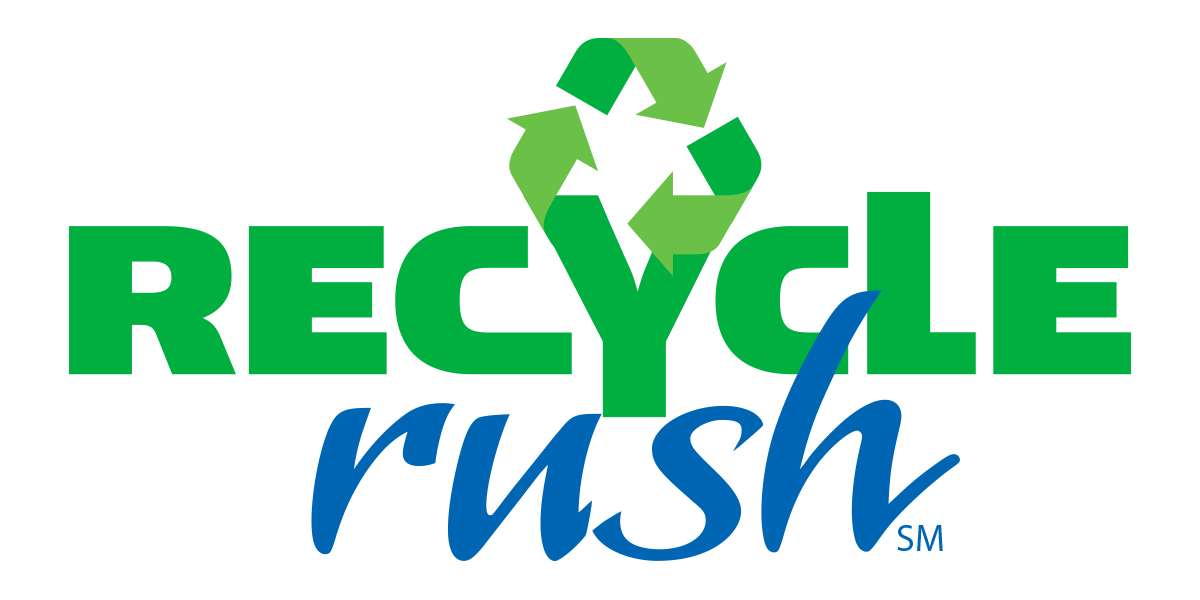
In Recycle Rush, two alliances of three robots compete to score points by stacking totes on scoring platforms, capping those stacks with recycling containers, and properly disposing of pool noodles, representing litter. In keeping with the recycling theme of the game, all game pieces used are reusable or recyclable by teams in their home locations or by FIRST at the end of the season. Each alliance has two minutes and thirty seconds to score as many points as they can.
The Field
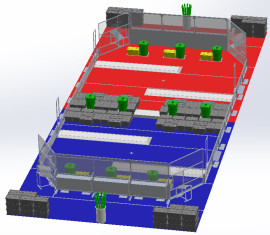
Recycle Rush is played on a 27-foot by 54-foot carpeted area, but each alliance is constricted to one 27-foot by 27-foot half of the field. The field is bisected by a wooden platform called the Step. Teams stack totes on the two Scoring Platforms designated for their alliance. The field is divided into three main zones on each side: the Staging Zones, where the robots are required to begin the game; the Auto Zones, located between the Scoring Platforms for each alliance; and the Landfill Zones, located between the Step and one Scoring platform, where teams will collect totes. Alliance Stations and Player Stations are located behind the Alliance Wall at each end of the field; additional totes and litter (pool noodles) will be waiting here to be put into play by the human player.
Game Pieces
Recycle Rush is played with totes, recycling containers, and litter. The match begins with 128 grey totes and 6 yellow totes. 32 gallon green Rubbermaid™ Recycling Containers are also used as game pieces, and litter, or green pool noodles, will be placed inside these containers to score points.
Autonomous Period
For the first fifteen seconds of the match, drivers are not allowed to control the robots. Instead, teams pre-program their robots to try to perform basic tasks. The main objectives to be achieved during this time period are: moving all robots in an alliance to the Auto Zone, moving any three recycling containers to the Auto Zone, moving all three yellow totes to the Auto Zone, and stacking all three yellow totes in the Auto Zone.
Teleoperated Period
After the fifteen second Autonomous Period, drivers assume direct control of their robots. Alliances must stack totes on the Scoring Platforms, cap the stacks with recycling containers, and dispose of litter by placing it in the containers or in the landfill. Points can also be earned by cooperating with the opposing alliance to place or stack four yellow totes on the Step.
Scoring
In Recycle Rush, points are calculated at the end of the Autonomous and Teleoperated Periods. Coopertition Sets and Stacks are awarded points as soon as they are accomplished.
